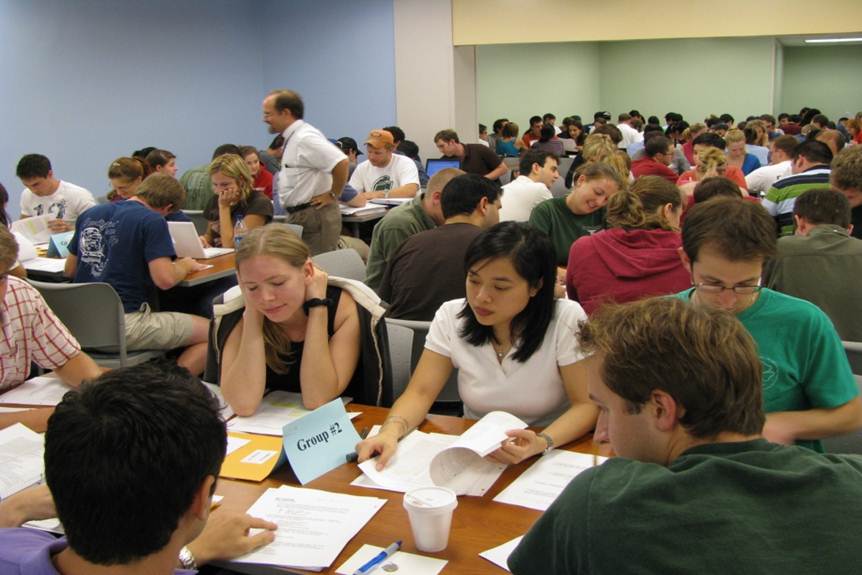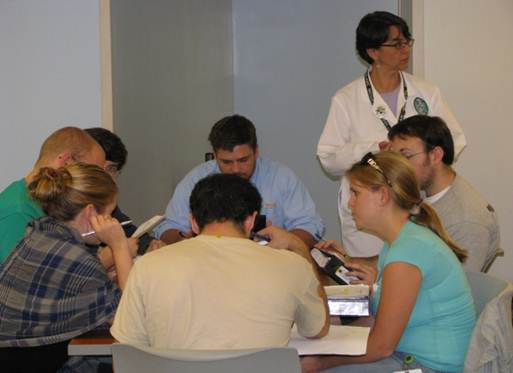Introduction Readings Learning Modules

Can you see yourself in this picture?
Introduction
Just one faculty facilitator can guide this large collection of small groups through a TBL session with students as active participants in their own learning process and working in teams to learn, self-assess and report. TBL helps students with conceptual & applied learning, and fosters development of teamwork and communication skills.
Students also learn and practice peer evaluation during TBL.
Tulane School of Medicine began using Team-Based Learning™ (TBL) during 2008-2009 in response to the dean’s initiative to introduce team training and active learning into the curriculum, to address the development of competencies related to improvement in patient care and safety,
Team-Based Learning™ (TBL) is a learner-centered, small-group instructional technique that can substantially improve quality of learning in terms of:
- increasing problem-solving skills,
- decreasing lecture time,
- boosting student motivation,
- and promoting team work

The Team-Based Learning™ method, developed by Larry K. Michaelsen, PhD, allows a single instructor to conduct multiple small groups simultaneously in the same classroom. Learners actively participate through pre-class preparation, in-class group discussion, and post-class peer review. TBL focuses on application and integration of information rather than on memorization of facts. The instructor retains control of content, and acts as both facilitator and content expert guiding learning by selecting appropriate resources, providing an opportunity to apply knowledge, and clarifying questions and misconceptions. TBL allows assessment of both individual and team performance; consequently, it directly addresses the School of Medicine’s initiative to increase team-based and active learning experiences in the curriculum.
Readings
Suggested Readings
Getting Started with TBL
- Team-Based Learning Collaborative. A website with a multitude of resources for Team-Based Learning.
- 12 Tips for Doing Effective Team-Based Learning (TBL™)
Parmelee, D.X., and Michaelsen, LK
Medical Teacher; 32:118-122. 2010. - Team-Based Learning™: Moving Forward in Curriculum Innovation: A Commentary
Parmelee, D.X.
Medical Teacher; 32:105-107. 2010. - Factors Influencing Implementation of Team-Based Learning™ in Health Sciences Education
Thompson BM, Schneider VF, Haidet P, Perkowski LC, Richards BF
Academic Medicine: 2007 Oct; 82(10 Suppl):S53-6 - Using a Media Centre to Facilitate Team-Based Learning™
Ortega RA, Stanley G, Snavely A
Journal of Visual Communication in Medicine: 2006 June; 29(2):61-65 - Team-Based Learning™: A Strategy for InterprofessionalCollaboration
Rider EA, Brashers V
Medical Education: Volume 40, issue 5 (May 2006), p. 486-487 - Koles P, Nelson S, Stolfi A, Parmelee D, DeStephen D
Medical Education: 2005 Oct; 39(10):1045-1055 - Team Learning in a Medical Gross Anatomy Course
Vasan NS, DeFouw D
Medical Education: 2005 May; 39(5): 524. - Team-Based Learning™ in a Medical Gross Anatomy and Embryology Course
Nieder GL, Parmelee DX, Stolfi A, Hudes PD
Clinical Anatomy 2005 Jan; 18(1): 56-63 - Adaption of Team Learning to an Introductory Graduate Pharmacology Course
Dunaway, GA
Teaching and Learning in Medicine: 2005 Winter; 17(1):56-62 - Application of Team Learning in a Medical Physiology Course
Seidel CL, Richards BF
Academic Medicine: 2001 May; 76(5):533-534 - Ismail, NAS. Effectivenss of Team-Based Learning in Teaching Medical Genetics to Medical Undergraduates.
Malays J Med Sci. 2016 Mar; 23(2): 73-77. - Mann, K., & O'Neill, P. (2010). Facilitating a small-group discussion. In K. M. Skeff & G. A. Stratos (Eds.) (2010). Methods for teaching medicine (Chapter 4). Philadelphia, PA: ACP Press.
- Garrison, D. R. (1997). Self-directed learning: Toward a comprehensive model. Adult Education Quarterly, 48(1): 18-33.
- Eshach, H., & Bitterman, H. (2003). From case-based reasoning to problem-based learning. Academic Medicine, 78(5), 491-496.
